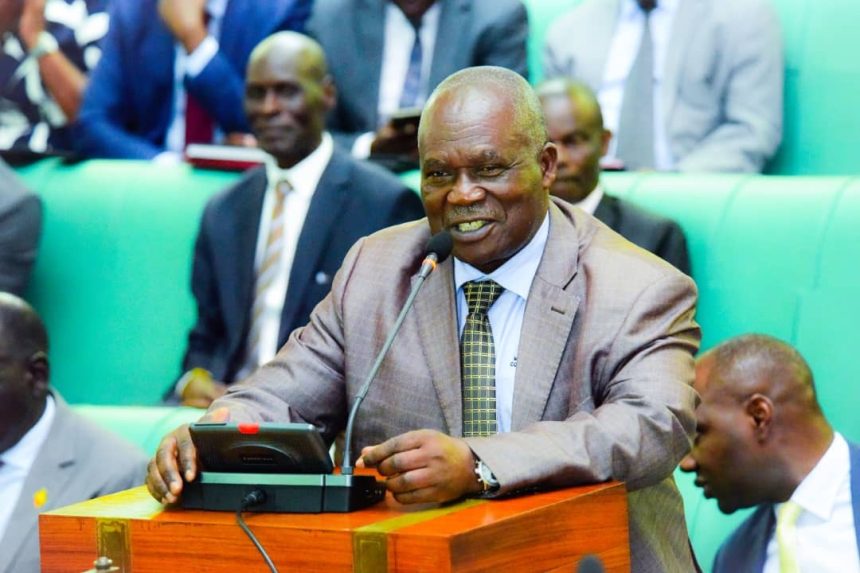The Minister of Public Service, Muruli Mukasa, has defended the need by the Government to raise UGX79.3Bn meant to be used as compensation to the 2,200 staff that are set to be laid off under the rationalisation of agencies, saying the move will see Uganda save Shs1Trn in funds that are being spent to run these agencies.
Minister Muruli made the remarks during a media interview recently, where he was clarifying the request of UGX79.3Bn that is indicated in the National Budget Framework Paper for 2024/25 by the Ministry of Public Service for this item, but no single penny has been allocated to this exercise.
The Minister kicked off by defending the rationalisation of agencies, with some of them turned into departments in mother Ministries, saying that the exercise will involve reviewing these agencies to remove overlaps, redundancies and areas where the Government is spending money and achieving very little value.

“We need about UGX 80Bn to cover the costs that will go towards paying compensation for those workers who will be affected by rationalisation. We shall spend over UGX 80Bn, but the gains we are going to have over time is going to be over Shs1Trn, and this Shs1Trn certainly when we get it, certainly will be ploughed back into compensation,” said Minister Muruli.
The Minister further indicated that the rationalisation exercise started two years back. The Government is at the last stage, where the Ministry of Public Service will have to go to Parliament and change some of the laws that led to the creation of these agencies, as well as create new laws to facilitate the creation of the new entities that are being proposed.
He said,

“When the laws are done, and Parliament has done its job, this money is needed at once, it isn’t going to be phased. Over time, we found that some of the agencies were doing the same thing with the Ministries, but they were spending so much on the same thing. The Ministries were also there, even though the payments weren’t equal, so the whole thing, instead of encouraging efficiency, was encouraging inefficiency and unhealthy competition and jealousy and therefore, no motivation and no work.”
Responding to questions on whether this move won’t exacerbate the already high employment in Uganda, Minister Muruli Mukasa said that although figures from the Ministry of Gender and Labour indicate 9 million Ugandans are ready for jobs, public service can only employ 1 million people and the rest of the jobs will be created in the private sector, a dream he thinks can be actualised through the Parish Development Model.
The Minister said,
“Yes, there is a need to create more jobs, but the Government isn’t the one to create jobs, we need jobs in the service and say, even if we were 45 million of us, we don’t need 3-4 million public service workers, no, at most maybe we can have up to 1 million workers. According to the Ministry of Gender, Labour and Social Development, the people who are ready for jobs are around 9 million, they have the skills and are for the right job, so the 9 million jobs aren’t going to come from public service because if you do that, you will spoil everything and people will be redundant and paid very little.”
It should be recalled that in November 2023, Parliament blocked plans by the Government to disband several public agencies, including Uganda National Roads Authority (UNRA), National Agricultural Advisory Services (NAADs), Uganda Coffee Development Authority (UCDA), etc, until the cost and legal implications of merging these agencies are explained by Government.
This followed the tabling of the Constitutional Amendment Bill 2023 by Deputy Attorney General, Jackson Kafuuzi in which the Government was proposing to amend the constitution to merge the Equal Opportunities Commission (EOC) with the Uganda Human Rights Commission since the articles in the constitution formed the two entities.
However, Kafuuzi’s actions were halted by Speaker Among, who tasked Minister Muruli to explain why the Government had brought an omnibus The Rationalisation of Government Agencies (Repeals And Amendments) Bill, 2023, at once instead of handling each agency separately, saying such a move would ensure that each agency would be handled by its sectoral Committee, instead of having the scrutiny handled by one Committee.
Minister Muruli conceded to the Speaker’s request and promised to table separate bills for all the over 40 agencies that were to be merged, but by the time Parliament closed off business in December 2023, the Bills hadn’t been tabled.
The government in its proposal, defended the rationalisation on the ground that whereas most of the agencies are necessary due to the critical nature of the functions they perform, the Government established that a certain limited number of agencies were established without due consideration to the aspects of institutional harmony, functional duplications, overlaps and affordability.
“The proliferation of agencies has created mandate overlaps and jurisdictional ambiguities among the agencies. Additionally, the high cost of administering the agencies has drained the national treasury at the expense of effective service delivery. This has overstretched the capacity of the Government to sustain them. Government has also established that the generous salary structures of the agencies have created salary disparities between employees of the agencies and public officers in the traditional civil service leading to de-motivation of human resources in the mainstream public service,” read in part the proposed Bill.
However, Minister Muruli’s assertion that the rationalisation will save Government over Shs1Trn, in the long run, is questioned by the figures provided by the Ministry of Finance projections in the 2024/25 national budget, which indicates that the Government is projected to spend UGX 8.909Trillion in payment of wages of all civil servants, which is an increase from UGX 7.512 trillion that will be spent in the 2023/24 national budget.
Ministry of Finance figures further indicate that the expenditure on wages will be increasing in the coming years, including UGX 11.500 trillion in 2025/26, UGX 11.692 trillion in 2026/27 and UGX 11.850 trillion in 2028/29.
The Minister’s argument is further brought into question when it comes to recurrent expenditure that caters for payment of rent, utilities like water, electricity, and cleaning services, among other items, with the Ministry of Finance projecting an increase in the next five years.
According to the 2024/25 national budget framework paper, the Government is expected to spend UGX 11.136 trillion in non-wage (recurrent expenditure), up from UGX 11.807 trillion that will be spent in 2023/24, while in 2024/25, recurrent expenditure will rise to UGX 12.563 trillion. In 2025/26 this will rise to UGX 14.274 trillion, while in 2026/27 this expenditure will be to the tune of UGX 15.025 trillion and in 2028/29 Government is expected to spend UGX 22.105 trillion on non-wage expenditure.








